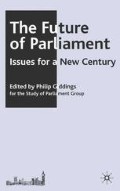Abstract
British politics is dominated by two major parties, Conservative and Labour, especially in Parliament. Of course, a significant proportion of members of the House of Lords sit as crossbenchers – 27.1% in 2004, plus the Law Lords and former Law Lords, but this still leaves more than two-thirds with party affiliations, although no party has an absolute majority. In any case, politically the Commons is much more important than the Lords. In 1945 eight MPs were elected as independents, but six sat for university seats abolished in 1950. Between 1950 and 1997 a handful of candidates managed to defy the party machines standing as ‘Independent Conservative’ or ‘Independent Labour’ (or ‘Democratic Labour’ in one case), but Martin Bell (Tatton) in 1997 and Richard Taylor (Wyre Forest) are the only true independents. Between 1945 and 1970, 97.9% of MPs were either Conservative or Labour. Third parties, mostly the Liberals, had their by-election successes, but tended to fall back at general elections. However, since 1970 third parties have had greater success at general elections, so that the proportion of Conservative and Labour MPs between February 1974 and 2001 fell to 92.3%, falling further to 88.4% in 1997 and 87.7% in 2001. Consequently, a number of Liberal Democrat, Scottish Nationalist and Plaid Cymru MPs have had parliamentary careers comparable in length to most Conservative and Labour Members. Many of the latter, however, have had ministerial careers denied their third party colleagues.
Access this chapter
Tax calculation will be finalised at checkout
Purchases are for personal use only
Preview
Unable to display preview. Download preview PDF.
Notes
Byron Criddle, ‘MPs and Candidates’ in David Butler and Dennis Kavanagh, The British General Election of 2001. London: Palgrave, 2002, p. 185.
Top Salaries Review Body, First Report: Ministers of the Crown and Members of Parliament. Cmnd. 4836, December 1971, para. 25.
Editor information
Editors and Affiliations
Copyright information
© 2005 Palgrave Macmillan, a division of Macmillan Publishers Limited
About this chapter
Cite this chapter
Rush, M. (2005). Career Patterns and Professionalisation. In: Giddings, P. (eds) The Future of Parliament. Palgrave Macmillan, London. https://doi.org/10.1057/9780230523142_4
Download citation
DOI: https://doi.org/10.1057/9780230523142_4
Publisher Name: Palgrave Macmillan, London
Print ISBN: 978-1-349-54464-6
Online ISBN: 978-0-230-52314-2
eBook Packages: Palgrave Political & Intern. Studies CollectionPolitical Science and International Studies (R0)

